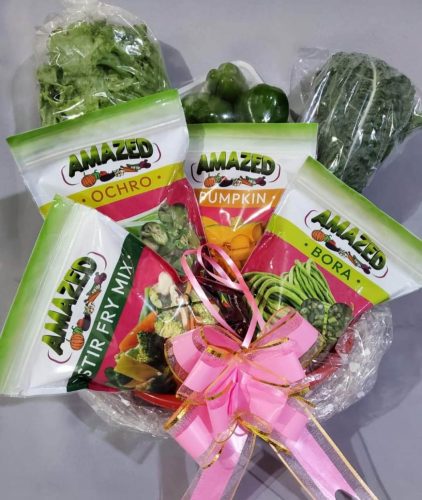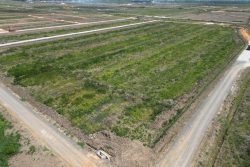If there may have been a time when business relationships between and micro-enterprises and what can be described as the country’s blue ribbon business establishments, notably, ‘brand name’ supermarkets, changing consumer habits have begun to shove that propensity behind us. Changing consumer behaviour have triggered innovations in the business culture that have resulted in the proliferation of new kinds of partnerships between small, even micro-vendors and most of the country’s upmarket food distribution establishments that would appear to be working to their mutual advantage.
Time was when the roles of the fruit and vegetable vendors and the ‘brand name’ food distributors existed on separate plains. If your mission was to ‘shop’ fruits and vegetables you had to brave the bustle and crush of the municipal markets where the vendors bawled their offerings in your ears to get what you wanted. Supermarkets offer a more rarified, environment, characterized, in large measure, by sealed and canned containers and giant coolers of perishables all assembled in a reassuring shopping environment.

While the traditional market ‘crush and bustle’ may still be thriving, the changing shopping ‘culture’ can hardly be denied. Research into consumer behaviour has led supermarkets to discover pointed shifts in the local purchasing culture that can work to their advantage in an increasingly competitive world. What used to be the leisurely Saturday stroll through the municipal markets, enduring the ‘bump and grind’ associated with ‘picking up’ the week’s fruit and vegetables may still be favoured by a majority of consumers, never mind the fact that increasing numbers are gravitating to the more rarified environment.
What, over time, became a desire on the part of consumers to find more convenient ways of ‘shopping’ greens and vegetables has given rise to a discernable new trend that co-exists alongside the old ways; so that if there is still very much a ‘market’ for consumers who favour the experience of loud-mouthed (mostly female) vendors generously sprinkling their ‘fresh greens’ whilst bawling their bargains into your ears, there has been a simultaneous growth in demand for the more sedate, more sanitized pace of the contemporary supermarket where the ‘hassle’ of bargain – hunting is clinically eliminated and the exercise reduced to the trip between the Cooler and the Cashier.
Zinzi Elonna Atkins-Dey and her husband Mortimer Andrae Dey are numbered among an increasing number of contemporary ‘vendors who, these days, serve as convenient middlemen between the farmer and the consumer’. Between them, they manage an establishment named Amazed Vegetable Distribution. Situated at 2925 North Ruimveldt, Georgetown, the company’s operations are underpinned by collaboration with local farmers, a mutual understanding that successful ‘deals’ binds the seller to the practice of supplying high-quality produce.
Product presentation is a function of collaboration between the seller and the buyer, in the latter instance, the management of the receiving outlet. There is, the couple told the Stabroek Business, no room in the equation for sub-standard product. Contextually, the successful continuity of the relationship between Amazed Vegetable Distribution and its market depends in large measure on its three-member team of ‘processors.’ They are, in essence, the face of the organization. The company is currently in its fourth year, its owners having ‘traveled’ some distance from being friends as students at St. Rose’s High School (where Mortimer served as a Prefect) to tying nuptials and eventually into establishing a business of their own.
Attraction to and support for their business venture came, initially, from relatives and friends who quickly appreciated the convenience of the couple’s ready-to-cook greens and vegetables. Acting on the advice of their friends, they took their ‘offerings’ to the La Penitence Market where they were rewarded with two sellout Sundays. Buoyed by the backing of both relatives and customers, the couple first contacted Nirva Superstore on Sherriff Street where they were asked to submit samples, a barcode and prices. They ‘sealed’ the Nirva ‘deal’ and moved on. Thereafter, their products secured further acceptance at several other high-profile Supermarkets including Mattai’s, Massy stores, Survival Supermarket, Bounty and Real Value.
These days, the Company not only offers the market twenty (20) different packaged vegetables, it is also working towards meeting the criteria for securing the Guyana National Bureau of Standards ‘Made in Guyana’ Mark. The couple have dared to dream too. They shared with the Stabroek Business, their ‘dream of expanding their operations into other regions of Guyana and eventually, into the wider Caribbean’. Zinzi credits her ability to take the company forward due to her stint as Senior Marketing Officer at one of the capital’s leading supermarkets. Her husband, she says, has, over time, become a highly competent salesman. The two have more than an Alma Mater in common. They are both passionate about ‘standards,’ their preoccupation with ‘image’ causing them to continually tinker with their product packaging in an effort to enhance customer appeal and to move their products closer to export readiness. Packaging, Zinzi says, has made a considerable dent in their savings.
Beyond the other things that they have in common, the two were also both raised by single parents. Accordingly, they both say, they have first-hand knowledge of the challenges that derive from the circumstance. This, they say has heavily influenced their ‘prejudice’ towards both employment of single parents and making humanitarian monthly ‘giveaway’ gestures to single parents. Zinzi says she follows the media regularly in her search for deserving candidates for the company’s charitable gestures. If she has a considerable business challenge, Zinzi says, that challenge often reposes in finding consistently reliable employers. Here in Guyana, however, she has come to understand that there are few options to simply ‘rolling with the punches.’
The company’s five-step process for the preparation of the vegetables for the market has been ‘cleared’ by the Government Analyst Food & Drugs Department. The vegetables are washed, air dried and chopped up prior to packaging and sealing. Quality, Zinzi says, begins with selection of vegetables. She sources vegetables from a mix of local farmers and the National Agricultural Research Educational Institute (NAREI). There is, she says, room for improvement, in the contracts which she has with the farmers. There are instances in which the farmers decline to agree to reduce prices when their own operating costs are reduced. She is, however, appreciative of the fact that her own customers are invariably disposed to her own price increases. Likewise, she is prepared to share her own reduced operating costs with her customers.
Relations with the company’s major markets aside, the company has created customized ‘Baskets of Vegetables’ to meet the needs of various sizes of families. That particular end of the business, Zinzi says, is going well. Focused on growth as they are, the couple applied for a plot of farmland. Zinzi told the Stabroek Business the plot allocated is situated some distance away from a water source. The development of the plot, she says, will be a high-cost exercise. While she is yet to undertake any comprehensive research, Zin zi says that she is altogether persuaded of the growth of her market. She is, she says, focused on continuing to go forward.
Amazed Vegetables Distribution can be reached at 641-8266








